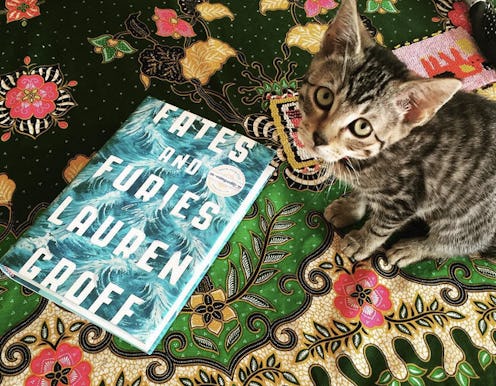
Sure, reading a book lickety-split can be fun, but so is devoting a few, couch-bound days to a big novel (hiya, Harry Potter fans). For the next cozy weekend you have planned, make room for Lauren Groff's Fates and Furies. It's the author's fourth book, and it's already snagged her a 2015 National Book Award nomination. If that's not enough to get you enticed, just stay with me and hear what it's about, and I promise you'll be on board. Fates and Furies is a sensual saga, the tale of Lancelot "Lotto" Satterwhite and Mathilde Yoder, who marry after a two-week courtship at Vassar. Groff depicts the evolution and complications of couplehood, yet one thing remains constant: "Their marriage had always been about the sex."
Readers will love the glistening particulars of Lotto and Mathilde, their luxurious histories: Lotto's mother worked as a mermaid at a Florida tourist attraction, Mathilde's childhood memories are salted caramel- and camembert-scented. But they'll also appreciate how Groff uses those specific details to explore familiar experiences: "Lust!" she writes, in the voice of the omniscient narrator who oversees the telling of these stories, "Old story renewed in young flesh."
Fates and Furies channels the oldest stories. Allusions to Greek myths and works of Shakespeare abound. Even the structure of the novel feels classic: Fates and Furies is divided into two sections. In the first, Fates, Lotto's side of the story unfolds. The heir to a Florida water fortune, Lotto is a born dramatist. "Even when he was alone, he performed," Groff writes. After teenage snafus find Lotto sent to a New England boarding school, his passion for the theatrical meets the stage. Buoyed by his prep school success, Lotto becomes a beloved actor at Vassar, where his charisma and charm and good looks facilitate his promiscuity, his "era of women" — which ends when he meets Mathilde, an enigmatic blonde.
Their shotgun marriage, a first basement apartment, failed attempts at landing significant acting jobs, scraping by on rice and beans and potluck parties — all that changes when Lotto drunkenly writes a play and realizes his true calling.
After so much of Lotto's take on the marriage, it's thrilling to find out what Mathilde does and who she really is. The answer catapults this sumptuous literary novel into Gone Girl territory.
If Fates suggests "Mathilde and Lotto had been born to nestle into each other like spoons in a drawer," the second section of the novel, Furies, which reveals Mathilde's perspective, does not so much refute that but show the darkness of that drawer, its confines and crannies, its secrets wedged into the corners. After learning how thoroughly Lotto believes he knows his wife, it's a shock to read Mathilde's thoughts, especially those like, "the sum of her life ... was far greater than its sum of love."
I'm painting with broad strokes because what I loved about Fates and Furies was its plot twists — which I'm definitely not revealing here! These proliferate in the Furies section, when Mathilde methodically explains all she has hidden from her husband in order to keep their marriage afloat. "Somehow, despite her politics and smarts," Groff writes, "[Mathilde] had become a wife, and wives, as we all know, are invisible. The midnight elves of marriage. The house in the country, the apartment in the city, the taxes, the dog, all were her concern: he had no idea what she did with her time."
Part of what propels this novel is that reward: after so much of Lotto's take on the marriage, it's thrilling to find out what Mathilde does and who she really is. The answer catapults this sumptuous literary novel into Gone Girl territory.
Except, of course, this thriller comes with sentences that stop you in your tracks. Groff's prose is stunning, an embarrassment of riches. She describes a college friend who's slimmed down: "She'd lost sandbags of weight." A dog is an "earmuff with eyeballs." Lotto feels "carbonated with dark ideas." And, if you really want to geek out, Groff does things like this: "Threeways with two girls in someone's bathroom," a countdown of friskiness.
"Tell me the difference between tragedy and comedy," a teacher asks Lotto at prep school. This question haunts Fates and Furies. Though neither Lotto nor Mathilde's story is wholly tragic or comic, their dissident experiences of the same marriage show, as Groff puts it, that every story is, "a question, in the end, of vision."
Image: Megan Brown; stonecutterjournal/Instagram